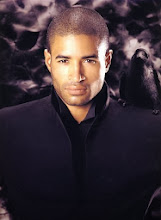- The era interested me to some degree. 19th century western America falls into that category.
- I needed to for a story.
- I saw something in a movie or book that intrigued me.
That means, I know next to nothing about most English history. As a general observation, most historical romances set in England, whether it's Regency, Victorian, Elizabethan, or something else, have to either be written by an author I really, really, really trust, or be so much fun that I don't care about the setting.
All of this is my way of explaining that I had no idea what I was setting myself up for when I sat down to watch The Duchess last night.
For those who don't know what it is, it was a 2008 film starring Keira Knightley and Ralph Fiennes, about Georgiana Cavendish, the Duchess of Devonshire, and her rather dramatic life. It won Best Costume Design at the Oscars, as well as garnering an Art Direction nomination, and since I'm in an Oscar mood lately - and was on my own so couldn't sit and watch one of this year's nominees because I'd promised my husband we'd see them together - it seemed to fit the bill.
And it did, for the first two-thirds of the movie. The Duchess is an exuberant personality, married very young to a much older, colder man in desperate need of a male heir. She bears two daughters, is forced to raise another of his illegitimate daughters as her own, and puts up with his many affairs, until he starts an affair with her best friend (played by Hayley Atwell, who isn't nearly as interesting here as she is in Agent Carter). That's when the tides turn. She's furious and hurt and devastated at losing the one thing that was hers, as well as being humiliated by the move.
It only goes downhill from there.
I finished the film pissed. It's based on a true story, so considering the time period, you can figure out why. But I'll admit, I wanted the escapism. I wanted emotional retribution for Fiennes' condescending attitude and tight-fisted manipulation of his marriage and wife. I wanted what I perceived to be a happy ending. I didn't get it. It's not a tragic ending, thank god, but it certainly wasn't emotionally fulfilling. A good part of that is likely due to the fact that beyond my utter loathing for the kind of man she was married to, it felt like Fiennes phoned the performance in. Atwell didn't convince me, either. Maybe I should've guessed something would be up when Knightley, who I usually find tolerable but hardly great, gave the best performance of the bunch.
I would hardly deem it a waste of time, though. The costumes are sumptuous, and until that awful moment when I realized it wasn't going to end the way I wanted it, I was really enjoying myself. Plus, the movie interested me enough to pursue more information on the period and the players, which doesn't happen all that often for British history. But most importantly, it made me grateful for the time I live in. While there are a whole host of rights issues that still have to be sorted out, I have choices the Duchess could only dream about.
In a world where I'm often frustrated by the ignorance and small-mindedness too many display, a history lesson like this one is well worth it.




0 comments:
Post a Comment